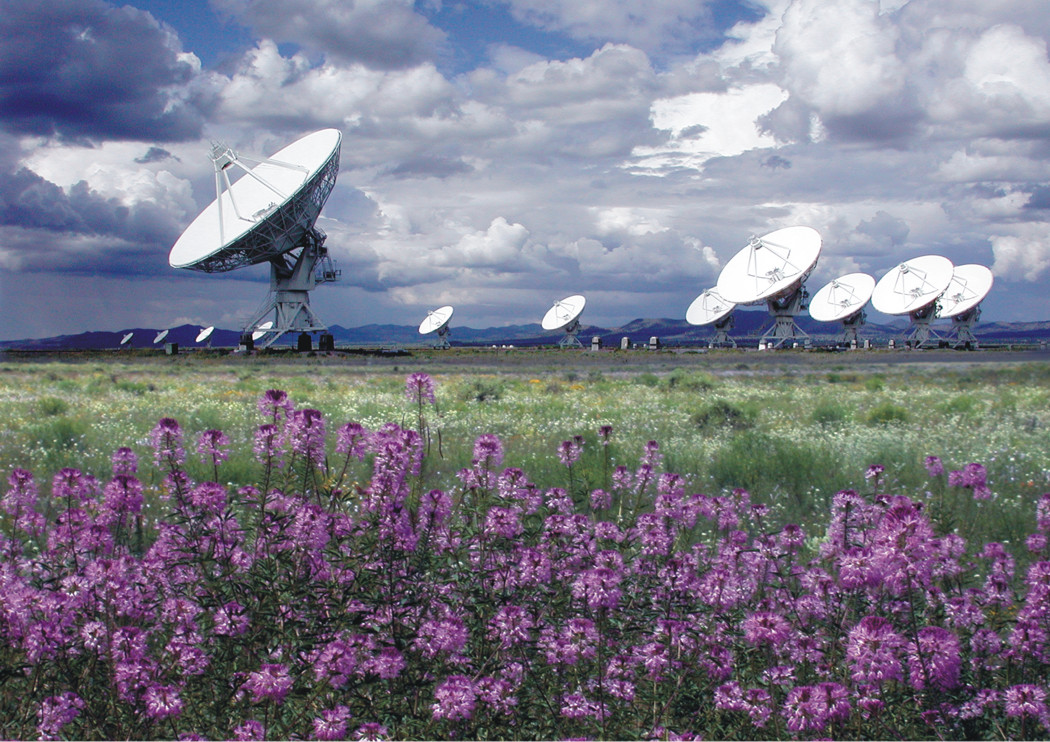
“Two possibilities exist: either we are alone in the Universe or we are not. Both are equally terrifying.”
— Arthur C. Clarke
The notion of the plurality of worlds and the existence of intelligent life elsewhere in the Universe has intrigued humankind since the time of the ancient Greek pre-Socratic philosophers of the 6th century BCE. The emergence of modern science during the 16th century finally provided the means with which the possibility of life elsewhere in the Universe could be empirically explored, through the use of the scientific method. The exciting discoveries of thousands of exoplanets during the last 20 years have led scientists to speculate that contact with extraterrestrial life could well happen within the next 20 years. If such a scenario were to come to pass, would we be able to perceive any extraterrestrial life as such? The first part of this article examines this question, by exploring the way with which the human mind and our perceptions of the world around us could possibly aid or hinder our searches to discover something so alien and unknown to our human senses and experiences.
The Great Silence
Humanity’s contact with other forms of life in the Universe has long been a staple of science fiction and fantasy, since Lucian’s satirical novel True History of the second century. During the genre’s long and productive history, writers have imagined a vast array of possible physical forms for their fictitious alien species, ranging from the fairly human to the utterly unrecognisable. The real-life scientific search for the discovery of extraterrestrial life has been mostly focused at looking for so-called life “as we know it”: one based on carbon, sunlight, and the presence of liquid water.
Even though it can be argued that this definition of life is too narrow and exclusive, it is nevertheless the only one we’re familiar with, so it is an obvious place to start. Yet, for all our searches, even the simplest forms of life elsewhere in the Universe (let alone intelligence) are apparently nowhere to be found. The vast immensities of space and time, and the practically infinite number of stars and planets in the Cosmos, indicate that life and intelligence should be abundant and that it should have already made it presence known to us by now. The apparent lack of any such evidence, known as the Great Silence, forms the basis of the famous Fermi Paradox, put forth by the Italian physicist Enrico Fermi during a luncheon conversation in 1950.

There hasn’t been any shortage of proposed explanations among the scientific community for resolving the question behind the Fermi Paradox. Maybe the emergence of intelligence is an extremely rare phenomenon and civilisations end up being too far apart to be able to communicate with each other. Or maybe civilisations arise all the time but wipe themselves out as soon as they are able to, or are ultimately destroyed by other natural causes. Or maybe there hasn’t been enough time for intelligence to fully arise in the Cosmos and the human species is the first such example so far. “It’s difficult for someone to truly grasp how staggering is the question behind the Fermi Paradox, if he hasn’t realised the magnitude behind the extraordinary numbers regarding the Universe’s dimensions,” writes Greek researcher and space analyst Thanassis Vembos. [1] “And these numbers aren’t only describing an immensity of space; they also describe an immensity of time. This is what lends such a great depth to the question behind the Fermi Paradox. Today, we think that the Universe is approximately 15 billion years old. Yet, hardly anyone can fully grasp the magnitude of this number. We just write ’15 billion’ and we think we’re done – just like with the national budget deficit. But 15 billion years is a very long time. Your heart will beat approximately 1 billion times during your entire lifetime. If a full year were to pass for every one of your heartbeats, you would need approximately 15 lives to cover the entire age of the Universe. Simply put, 15 billion years is such a long time, that every possible thing that can happen, has already happened … That would be enough time for even a single deviation from all the possible scenarios regarding the fate of intelligent civilisations to finally occur – just one civilisation that will not self-destruct, just one civilisation that will continue to use radio waves, just one civilisation that will not isolate itself, and so forth.”
If indeed that’s the case and alien civilisations can arise and persevere, then where are they? According to Robert A. Freitas Jr., a Senior Research Fellow at the Institute for Molecular Manufacturing in Palo Alto, Calif., the question constitutes a logical fallacy. “Less than 10% of the Earth’s surface, 1% of the Moon, 0.1% of Mars, and 10-7% of Venus (total 5 x 107 km2) has been surveyed to 1- to 10-m visible resolution,” writes Freitas. [2] “This leaves 99.96% of Solar System surface area (1.3 x 1011 km2) unexamined for likely artifacts … Objects buried or submerged are undetectable with current instrumentation. Large artificial habitats in the asteroid belt would appear visually indistinguishable from natural objects, especially since the belt population itself is poorly cataloged. The assertion that a resident artifact would alert us to its presence is an unwarranted, unsupportable, and untenable assumption.”
Yet, is the detection of extraterrestrial life just a case of discovering a life form with a biochemistry similar to our own? In what way, if any, do our own human interpretations and perceptions of what life should be play a role in this search?
The Limits of Perception
The nature of reality and the way with which we acquire knowledge of it has been the object of heated philosophical debate since antiquity, with some philosophers regarding reality as something existing independently of the human senses and perceptions, while others have argued that what we perceive as the external reality is nothing more than a mental construct inside our minds. Yet recent research on the physiology of the human brain and its inner workings seems to indicate that the truth might ultimately lie somewhere in between these antithetical worldviews.
We experience the world around us with the help of our five senses. Although highly sophisticated, their range is very limited, allowing us to only perceive a very small portion of physical reality. For instance, our eyes have evolved to be sensitive only to visible light wavelengths, which are a very small part of the whole electromagnetic spectrum, while our ears are sensitive only in a certain narrow range of audio frequencies. “While our own mental pictures of the world are more sophisticated than those of any other terrestrial life-form, they are nonetheless incomplete,” writes John Barrow, a cosmologist and theoretical physicist at the University of Cambridge. [3] “Remarkably, they are complete enough to recognise that they must be incomplete. We know that when we look at a chair, we receive only some of the information about it that is available to observers. Our senses are limited. We ‘see’ only some wavelengths of light ; we ‘smell’ only a range of odours; we ‘hear’ only a range of sounds. If we see nothing, then this does not mean that nothing is there. The extents of our senses, both quantitatively and qualitatively, are also the results of an adaptive selection process that must allocate scarce resources. We could have evolved eyes that were thousands of times more sensitive, but that ability would need to have been paid for by using resources that could have been used elsewhere. We have ended up with a package of senses that makes efficient use of the scarce resources available.”

Since as a species we have evolved a set of sensory organs that are sensitive to certain aspects of the overall physical reality, how could we perceive the presence of what we cannot see? Luckily, we can extend the range of our understanding of the world around us, with the help of our technology. We can observe the Universe over the entire electromagnetic spectrum with the help of very precise and advanced Earth- and space-based instruments, allowing us to see things that would otherwise have been completely unknown to us. Similarly, we can probe the depths of the Earth’s oceans and internal structure, gaining a better understanding of different parts of our Home Planet that are inaccessible to us.
Yet sensory information is just part of what constitutes perception. Various advances in neuroscience and perceptual psychology in recent decades have started to reveal the extent to which our perception of reality and the world around us is ultimately the result of a complex interplay between the external stimuli that we perceive with our senses and the way that these sensations are interpreted inside our brains. Psychology defines perception as the mental process by which our brains give meaning to the incoming sensations from the outside world, which in turn creates our experience of reality. The way that this process works is heavily dependent on many things, ranging from the cultural conditioning of our upbringings to our emotions, feelings, and personal experiences. “In psychology, this is what is known as a perceptual set. A perceptual set is basically a tendency to view things only in a certain way. Perceptual sets can impact how we interpret and respond to the world around us and can be influenced by a number of different factors,” writes educational psychologist Kendra Cherry. [4] “Perception can also be influenced by an individual’s expectations, motives, and interests,” writes author team Don and Sandra Hockenbury. [5]“The term perceptual set refers to the tendency to perceive objects or situations from a particular frame of reference. Perceptual sets usually lead us to reasonably accurate conclusions. If they didn’t, we would develop new perceptual sets that were more accurate. But sometimes a perceptual set can lead us astray. For example, someone with an avid interest in UFOs might readily interpret unusual cloud formations as a fleet of alien spacecraft.”
Further studies have indicated that this is a constant, largely subconscious process. “Many theorists assume that because it takes a lot of energy for brain processing, that the brain is only going to spend time processing what you’re ultimately going to perceive,” says Mary Peterson, a researcher at the University of Arizona’s Department of Psychology. [6] “But in fact the brain is deciding what you’re going to perceive, and it’s processing all of the information and then it’s determining what’s the best interpretation … This is a window into what the brain is doing all the time. It’s always sifting through a variety of possibilities and finding the best interpretation for what’s out there. And the best interpretation may vary with the situation.”
The role of human perception in our understanding of the Universe has had a major effect on the search of extraterrestrial life, whose history is rich with false alarms—instances when scientists had the erroneous impression that what they were observing were evidence for the existence of alien civilisations. Noted American astronomer Percival Lowell came to the spotlight during the late 19th and early 20th centuries for popularising the notion that a series of natural surface geologic features on Mars, which looked suspiciously like canals, were actually of artificial origin—part of an planet-wide irrigation system that was supposedly built by an advanced intelligent civilisation. More than half a century later, young graduate student Jocelyn Bell, while operating a newly commissioned radio telescope at the University of Cambridge, made a startling discovery of a strange radio source in the sky that kept pulsating constantly many times per second. Although these strange signals would later be found to originate from a previously unknown type of collapsed stars called pulsars, Bell and her team initially entertained the notion that what they had picked up could have been signals from an extraterrestrial civilisation, nicknaming the recorded radio signals LGM-1, for “Little Green Men.”
These examples serve as cautionary tales on the way that our assumptions and preconceived notions of how extraterrestrial life should be can influence our perceptions, leading us to see evidence for its existence where there is none. Could the same notions and assumptions also prevent us from acknowledging any possible real evidence?
Seen in this light, how possible would it be for the human species to acknowledge and understand the presence of a sufficiently advanced civilisation in another part of the galaxy? If our neurobiology and mind have evolved to perceive and understand a small part of the physical reality of terrestrial environments, how well are they equipped to understand something completely alien? Or is there a commonality of existence shared between all life in the Universe that renders this question irrelevant? “Lets say we have an ant hill in the middle of the forest,” argues American physicist Michio Kaku. [7] “And right next to the ant hill, they’re building a ten-lane super-highway. And the question is “Would the ants be able to understand what a ten-lane super-highway is? Would the ants be able to understand the technology and the intentions of the beings building the highway next to them?” Analogies such as these are a bit misleading, according to Vembos, for they imply the existence of only organic forms of life. “We should untangle our minds from the strict definitions we give to words like ‘life’ and ‘intelligence’, that lure us and trap us into certain patterns of thought and definitions of reality,” he argues. “Are wheats the only things growing in a field? There are also dandelions and mushrooms. And is there only one field on the entire planet? For that matter, aren’t there other flowers and trees, as well as an entire animal kingdom with its own unique diversity? … Imagine, just as there are different forms of matter [in the Universe], conditions entirely different from organic or inorganic matter could exist as well. Not intermediate, just different. An infinity of such conditions.”
Challenging ourselves to step outside of established patterns for the way we think extraterrestrial life should be might prove to be one of our best survival strategies as a species in the long run. As the late Carl Sagan so insightfully remarked, in a deeper sense the search for extraterrestrial intelligence is a search for who we are.
References:
1. http://www.vembos.gr/Fermi.htm
2. http://www.rfreitas.com/Astro/ThereIsNoFermiParadox1985.htm
3. The Artful Universe Expanded, Oxford University Press
4. http://psychology.about.com/od/pindex/a/perceptual-set.htm
5. Psychology, Fifth Edition, Worth Publishers
6. ‘Your Brain ‘Sees’ Things Even When You Don’t’, Association for Psychological Science
7. http://dailygrail.com/features/michio-kaku-impossible-science
Want to keep up-to-date with all things space? Be sure to “Like” AmericaSpace on Facebook and follow us on Twitter: @AmericaSpace




Both are equally terrifying but for different reasons. If they exist they will probably wipe us out because we are not going to be prepared.
If they don’t exist we could wipe ourselves out for the exact same reason we are unprepared to meet them.
We depend on political/marxist children to determine our future. Russia is less marxist than we are in many respects. The main difference being they quote Marx while we just do Marxism without awareness.
Flushing this Marxist reasoning out would move us ahead by leaps.
You raise an interesting point Ken.
Indeed, how relevant is politics, seen from a cosmic perspective, considering that it’s often an impediment of human progress rather an enabler? Could this notion have any meaning at all for other intelligent life in the Universe? The possible communinication with an extraterrestrial intelligence would put such societal institutions like politics in a whole new perspective.
Whether there is intelligent, microbial or some other life forms beyond our limited perceptions is perhaps beside the point. The sheer magnitude of “numbers” of a potentially limitless Universe tells us that we are not “alone” (whatever definition one may apply to that term). Everything that can happen has already happened,,,,,the enormity of time….- all point to the ubiquity of the cosmos. Terrifying? Not at all. Neil DeGrasse-Tyson said it best, “We are in the Universe and the Universe is within us.” (I think I got the quote correct).
I wholeheartidly agree with Neil deGrasse Tyson’s quote, Tom (and yes, you got it right!). One point I tried to make with the article was that we should expand our thinking and definition of what extraterrestrial life is, beyond the limiting ‘life as we know it’ definition that has driven astrobiology research for too long I think. Indeed, the immensity of space and time indicates that whatever can happen, has already happened. On the other hand, we should acknowledge our own cultural and biological limitations of perception, and widen the scope of our research for life, into areas that might seem ‘impossible’ at first glance. The history of human culture and science has shown that the Universe isn’t required to conform to our anthropocentric notions and expectations.